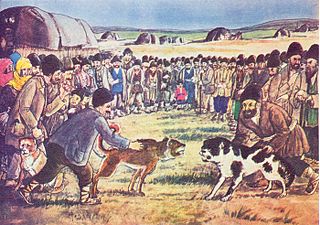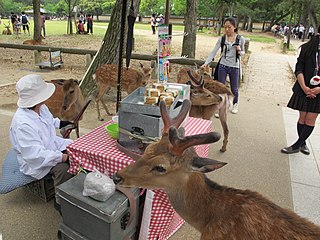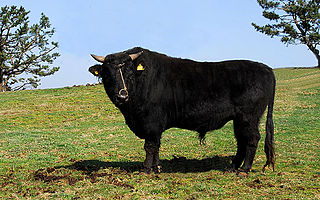
Veal is the meat of calves, in contrast to the beef from older cattle. Veal can be produced from a calf of either sex and any breed, however most veal comes from young male calves of dairy breeds which are not used for breeding. Generally, veal is more expensive by weight than beef from older cattle. Veal production is a way to add value to dairy bull calves and to utilize whey solids, a byproduct from the manufacturing of cheese.

Dog fighting is a type of blood sport that turns game and fighting dogs against each other in a physical fight, generally to the death, for the purposes of gambling or entertainment to the spectators. In rural areas, fights are often staged in barns or outdoor pits; in urban areas, fights are often staged in garages, basements, warehouses, alleyways, abandoned buildings, neighborhood playgrounds, or in the streets. Dog fights usually last until one dog is declared a winner, which occurs when one dog fails to scratch, dies, or jumps out of the pit. Sometimes dog fights end without declaring a winner; for instance, the dog's owner may call the fight.

A humane society is a group that aims to stop cruelty to animals. In many countries, the term is used mostly for societies for the prevention of cruelty to animals (SPCA). In the United Kingdom, and historically in the United States, such societies provide waterway rescue, prevention and recovery services, or may give awards for saving human life.
A Society for the Prevention of Cruelty to Animals (SPCA) is a common name for non-profit animal welfare organizations around the world. The oldest SPCA organization is the RSPCA, which was founded in England in 1824. SPCA organizations operate independently of each other and campaign for animal welfare, assist in the prevention of cruelty to animals cases.

Cruelty to animals, also called animal abuse, animal neglect or animal cruelty, is the infliction by omission (neglect) or by commission by humans of suffering or harm upon non-human animals. More narrowly, it can be the causing of harm or suffering for specific achievements, such as killing animals for entertainment; cruelty to animals sometimes encompasses inflicting harm or suffering as an end in itself, referred to as zoosadism.
The Anti-Cruelty Society is an animal welfare organization and animal shelter in the River North neighborhood of Chicago, Illinois. The Anti-Cruelty Society is a private, not-for-profit humane society that does not receive government assistance. It is one of the largest such organizations in the United States. The organization offers adoption, veterinarian, and training services.
The Humane Society of the United States (HSUS) is an American nonprofit organization that focuses on animal welfare and opposes animal-related cruelties of national scope. It uses strategies that are beyond the abilities of local organizations. It works on issues including pets, wildlife, farm animals, horses and other equines, and animals used in research, testing and education. As of 2001, the group's major campaigns targeted factory farming, animal blood sports, the fur trade, puppy mills, and wildlife abuse.

World Animal Protection, formerly The World Society for the Protection of Animals (WSPA) is an international non-profit animal rights organization that has been in operation since 1981. The charity describes its vision as: A world where animal rights matter and animal cruelty has ended.
Humane Society International (HSI) is the international division of The Humane Society of the United States. Founded in 1991, HSI has expanded The HSUS's activities into Central and South America, Africa, and Asia. HSI's Asian, Australian, Canadian, and European offices carry out field activities and programs.
The Universal Declaration on Animal Welfare (UDAW) is a proposed inter-governmental agreement to recognise that animals are sentient, to prevent cruelty and reduce suffering, and to promote standards on the welfare of animals such as farm animals, companion animals, animals in scientific research, draught animals, wildlife and animals in recreation.
Animal welfare and rights in Malaysia is about the laws concerning and treatment of non-human animals in Malaysia. Malaysia has had a national animal welfare law since 1953, though it was criticized for being weak and under-enforced. In 2015, Malaysia passed an updated animal welfare law strengthening protections for animals and penalties for animal cruelty. Animal protection efforts in Malaysia appear to be exclusively welfare-driven rather than rights-driven.

Japan has implemented several national animal welfare laws since 1973, but its protections for animals are considered weak by international standards. Animal activism and protection laws in Japan are mainly focused on the welfare of domesticated animals and farm animals.

Animal welfare and rights in South Korea is about the laws concerning and treatment of non-human animals in South Korea. South Korea's animal welfare laws are weak by international standards. There are a handful of animal welfare and rights organizations working in South Korea, which appear to be focused largely on the welfare of companion animals and the dog meat trade.
Animal welfare and rights in Canada is about the laws concerning and treatment of nonhuman animals in Canada. Canada has been considered to have weak animal welfare protections by the organization World Animal Protection. The vast majority of Canadians are for further animal protections, according to a poll conducted on behalf of Mercy for Animals.
Animal welfare and rights in South Africa is about the treatment of and laws concerning non-human animals in South Africa.
Animal welfare and rights in Ethiopia is about the treatment of and laws concerning non-human animals in Ethiopia. Ethiopia has highly limited animal welfare regulations by international standards, and appears to have little animal activism.

This article is about the treatment of and laws concerning non-human animals in Australia. Australia has moderate animal protections by international standards.
Animal welfare and rights in Mexico regards the treatment of and laws concerning non-human animals in Mexico.

National Council of Societies for the Prevention of Cruelty to Animals (NSPCA), also known as the National Council of SPCAs, is the largest and oldest animal welfare organisation in South Africa. The NSPCA handles all matters relating to animal cruelty involving all animal species and is a registered Non-Profit Organisation registered with the Department of Social Development.









